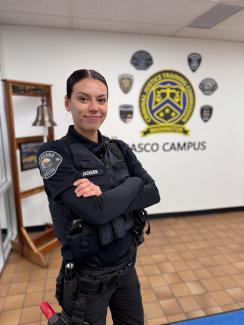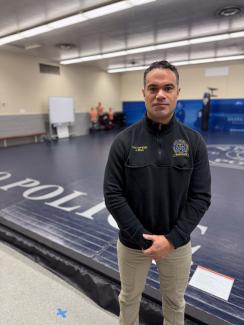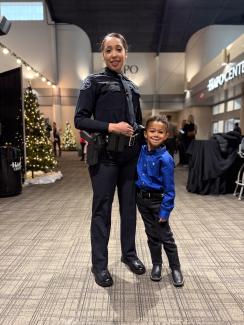At the Southeast Regional Campus in Pasco, Washington, the future of law enforcement is being built—one recruit at a time. As one of two new academies launched by the Washington State Criminal Justice Training Commission (WSCJTC), the Pasco facility is crucial in reducing recruit wait times and providing local officers with the opportunity to train and serve within their own communities.
By expanding training access, WSCJTC ensures law enforcement agencies across Washington are staffed with well-prepared officers who are ready to protect and serve.
Turning Passion into Purpose

For Tayler Jackson, a recruit from the Richland Police Department, joining law enforcement was about aligning passion with purpose.
“I’ve always loved true crime, and I thought – why not make my job what I love,” Jackson said. “Training was more intense than I thought it would be, but everything started to click—especially around domestic violence cases. Learning the 'why' behind what we do made a big difference.”
Jackson’s background in forensic psychology and her experience working in hospital security in Tacoma laid a foundation for understanding the human side of policing.
Compassion and Communication at the Core
Emotional intelligence and de-escalation are central to WSCJTC Academy’s curriculum. Recruits like Jackson are trained to approach every situation with empathy and professionalism.
“Just because someone is a criminal doesn’t mean they aren’t human. Even if they made a bad choice, our job is to treat them with compassion and empathy,” Jackson explained.
This focus on emotional intelligence ensures officers can build trust and effectively serve diverse communities.
Training Close to Home, Serving Close to Home

The Southeast Regional Campus offers local recruits the opportunity to train in their communities, which lowers stress and helps them stay connected with family.
“For local recruits, being able to train here and go home every night lowers stress and improves the overall experience,” said TAC Officer Jeff Muai. “It allows them to stay connected to their families and communities throughout the process.”
For Stephanie Perez, a recent graduate of the Pasco academy and officer with the Pasco Police Department, the local facility made her law enforcement career possible.
“As a single parent, having the academy nearby made all the difference. If it wasn’t for the local academy, I wouldn’t have been able to attend,” Perez shared. “Being able to come home to my son every night meant I could pursue this career without sacrificing time with my family.”

A New Era of Community-Based Training
Training recruits in their communities leads to stronger, more effective officers. TAC Officer Muai emphasized how recruits gain valuable insight into local resources and build relationships to serve them in the field.
“When they leave Pasco, they already have a grasp of the area’s resources—businesses, rehab facilities, community leaders. This familiarity helps them become proactive, effective officers,” Muai said.
From Day One to Graduation
The WSCJTC 19-week program transforms recruits, providing them with the skills, emotional intelligence, and problem-solving abilities essential for modern law enforcement.
“It’s rewarding to watch their growth,” Muai said. “You see the nerves when they first arrive, but by graduation, they’re ready to serve with pride.”
By reducing wait times and supporting local recruits, the Southeast Regional Campus is more than just a training facility—it’s an investment in safer, stronger communities across Washington.
About WSCJTC
Established in 1974, WSCJTC provides training to law enforcement, corrections officers, and other public safety professionals. Its mission is to establish certification and training standards so criminal justice professionals in Washington state have the knowledge and skills to protect the communities they serve.
